underwaterworld- tiny creaters of the big blue world #2
Hey guys, welcome to chapter 2.
If you haven't red my first post you may check it out here! https://steemit.com/underwaterphotography/@scotishfrog/underwaterworld-tiny-creaters-of-the-big-blue-world
Let’s continue to discover the beautiful underwater world with a magnifying glass.
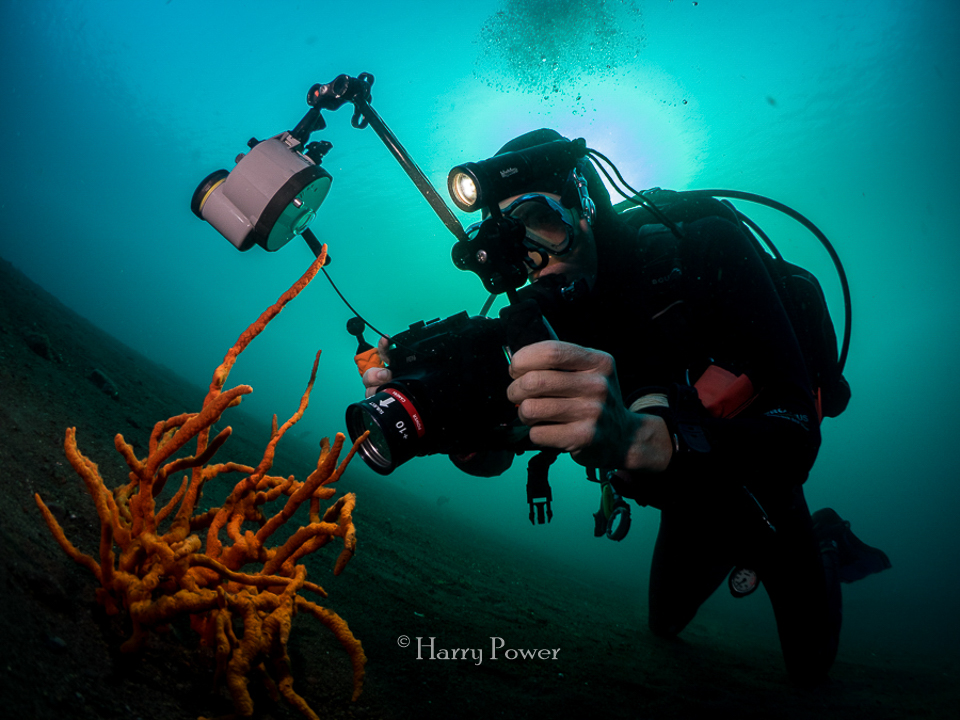.jpg)
Yup that's me, with my trusty Canon G16 in a Fantasea Housing, Inon z240 strobe and Big Blue Black Molly torch. Ahh, and we can't forget the Subsee +10 wet lens, that helps me to capture those tiny beasties!
Photo credits: Harry Power, my amazing girlfriend and dive buddy. She plays with the wide angle lens and fisheye.
Today I want to show you some crustaceans.
It is unbelievable the astonishing number of different species of crustaceans that we can encounter in a single dive. They have colonised every part of the ocean. Most of them are very well camouflaged in their habitat, and sometimes when I take a picture, I struggle to find the subject when I check the photos on my laptop! But, some are very colourful and pop right out of the picture; these ones are a real joy to find. Yes, they hide from me as they all think i want to eat them....
.jpg)
Here we have a bubble coral shrimp (Vir philippinensis). This shrimp is about 1.5cm long and only found on this particular coral. It is a symbiosis relationship where the coral provides a place for the shrimp to hide and the shrimp cleans the coral. In my opinion, there is probably more to it than just this, but more studies need to be conducted on the symbiotic relationships between crsutaceans and their hosts.
If you’re out on a dive and you see one of these corals, make sure to have a look in between the bulbs. You might be lucky enough to find this awesome little guy, actually usually two of them. The neon blue/purple line that they have on their transparent shell is truly stunning.
A little piece of advice, try not to move the water around the coral too much, as the coral will retract itself into its exoskeleton and the shrimp are more likely to hide themselves inside.
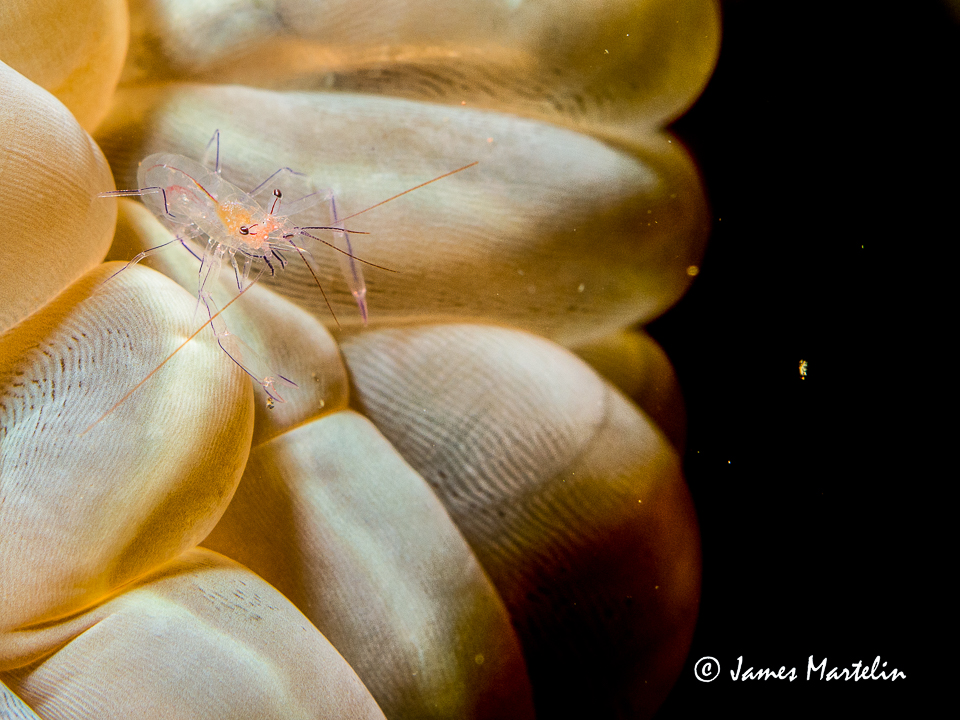.jpg)
Next contender to the show is Miss Mantis Shrimp!
.jpg)
This is one of my favourites, the spearing mantis shrimp(order: Stomatopoda). Evolution didn't miss these guys for sure.
There are loads of different species, all of various sizes and colours. They usually live on sandy bottoms in a burrow that fits them to perfection. It is common for me to find these orange ones on black sand rather than white. As you can see in this picture, the mantis shrimp has flatmates. In this case I imagine it is a snapping shrimp (another freak of nature, but not for today)
The spearing mantis will stay in her borrow waiting for a fish to pass nearby, and in the blink of an eye (almost with the acceleration rate of a bullet), launch her two speared arms, to grab the fish and quietly eat it in her burrow.
I do not have the right camera to be able to capture THE attack, it is way too fast, I have even tried using video, (maybe one day if this blog pleases people = ) but it is pretty cool to watch this predatory shrimp doing what she does best!
Here is another variant of the spearing mantis shrimp:
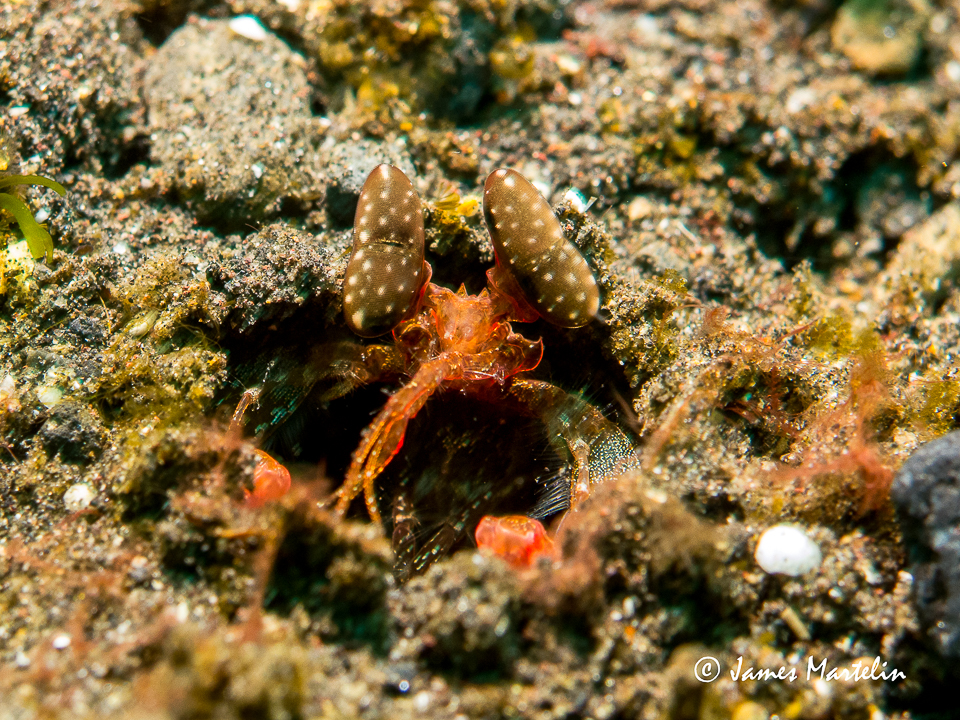.jpg)
There are two kinds of mantis shrimp; the other kind has clubs instead of spears.
It is one of the clubbed variety that is the most “famous” because of its stunning bright colours. The peacock mantis shrimp. This kind is also more active, usually has two or three entrances to her burrow, and you can see them 'running' around the reef looking for food ( mainly other crustaceans (crabs) and shells).
They are very territorial too, and it is common to see them fighting! It can be pretty rough, for one of them, as I have seen on multiple occasions, mantis killing other mantis.
If you were a mantis, you really wouldn't want to miss your shot while facing another mantis.
I could write and talk for hours about these guys, they are just awesome, lively and very curious. I could alos make a post just about them if you guys are interested. Let me know in the comments below.
Here is a shot we took a year and a half ago, on our first dive with our Fantasea housing. It is not a great shot, but it is something we have only seen once.
.jpg)
Two peacock mantis shrimps in the same burrow. We probably disturbed them whilst they were mating as they usually fight to death for territory!
Here is a link to a comic strip that I found. It is full of fun facts about the peacock mantis shrimp : http://theoatmeal.com/comics/mantis_shrimp
Advice: If you are taking pictures of a peacock mantis, be careful as your camera housing could get a nasty punch. Peacocks are known for breaking aquariums in captivity !
Next on the list is an other boxer! Not really but we call them boxer crabs (Lybia).
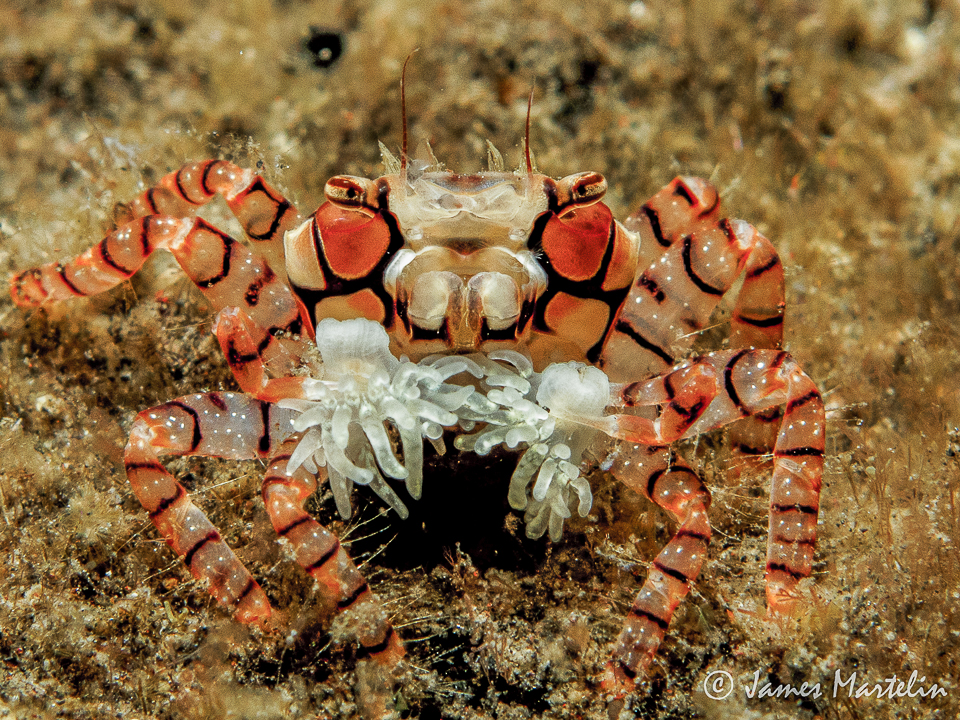.jpg)
Another very cool creature to find whilst diving is this guy. You will encounter them in shallow water, in round rocky bottom.
Why boxer? Humm yeah, I asked myself the same question, I would be more inclined to call them the 'pompomgirl' crab.
The particularity of this type of crab is that they hold a small species of anemone inbetween their claws. They use the anemone to scare predators away.
Come on, everyone knows how a sting of anemone is super painful.
When you spot them, you have to be very 'quiet' as they will find shelter under a rock as soon as they feel threatened. If you are lucky enough to spot a courageous one, he will do a little dance just for you, swaying the little anemone arms right and left to make sure you see them.
Here we have a swaying 'pompomgirl' boxer crab.
.jpg)
This particular defense system, using a potentienlly harmful living organism, is not unique to boxer crabs. Some species of crab will decorate their shell by growing anemones on it. The same goes for some hermit crabs, which are not actually a species of crab, despite their name... but there will be an article on them later ;)
I still haven't found the underwater shop that sells pet anemones to customise my dive cylinder for Halloween, but I am on the lookout and will make sure to share the info with you guys when I do!
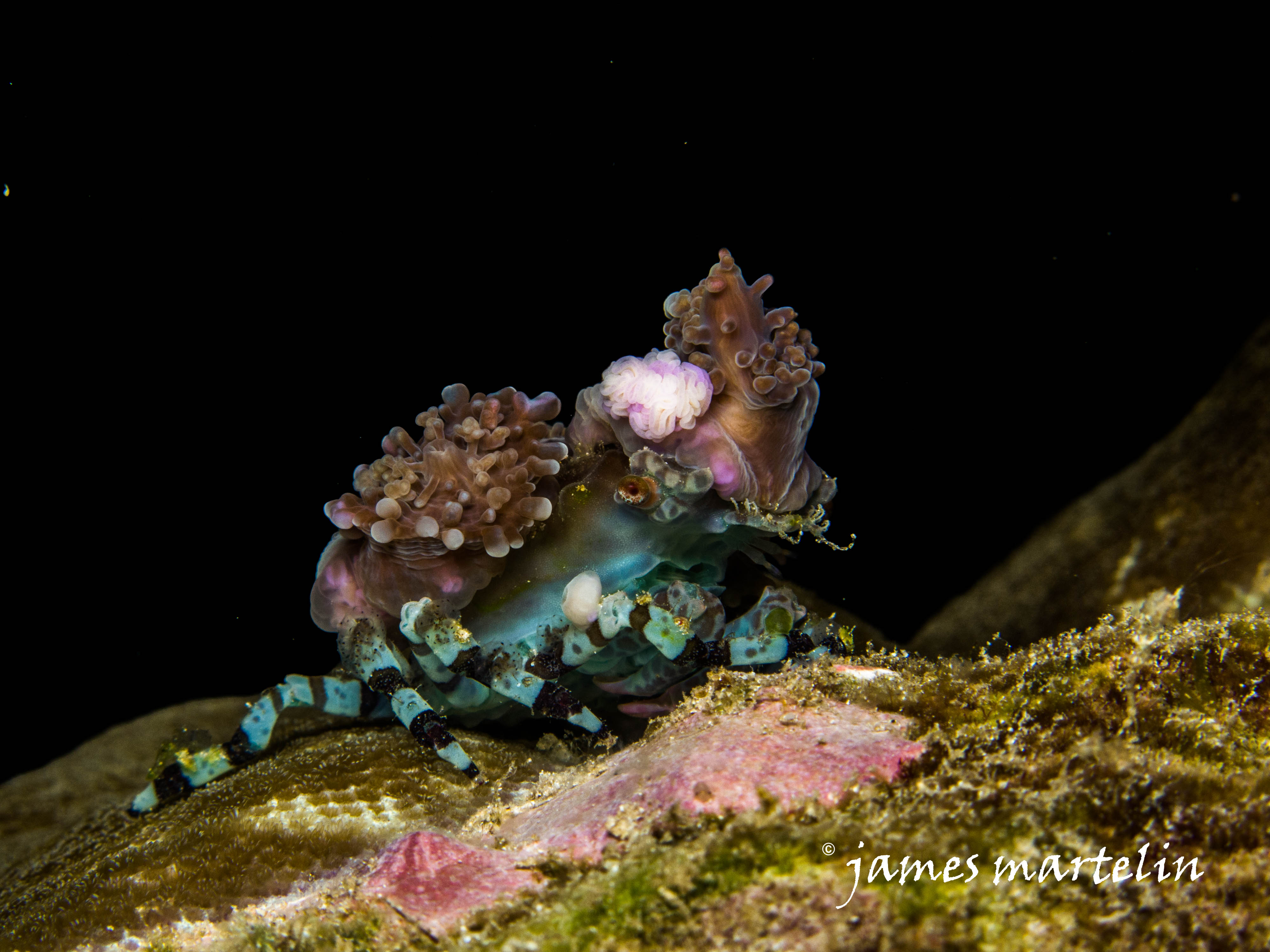
Here we have a decorator crab (Cyclocoeloma tuberculata). He attaches anemones to his shell so that he can move around the reef incognito. So weird,yes indeed, but absolutely gorgeous. Disclaimer: You will have to go night diving (on the 31st of October) to find this guy out Trick or Treating!
Ok, that's it for today. I hope you enjoyed, and learned something. As always, I enjoyed sharing and writing this post for the Steemit community.
If you have questions, requests, ideas, or simply something you think I can help with, make sure to leave a comment.
Thanks for reading and until next time, take care of OUR Oceans!
James zedivingFRog
Amazing shots - I struggle to take these types of photos out of the water let alone under water... Beautiful!
Thank you, I am glad you enjoyed. When I started taking pictures of the macro world (mainly bugs) I remember having two main problems, focus and light. I then realised that it was easier at night as everything is dark (No sun, shade, bright colors, dark colors). It allowed me time to adjust my settings inbetween shots because the whole ambiance stayed the same, and therefore get to know which setting to use on different situations. I did find it easier then to get what I wanted during the day.